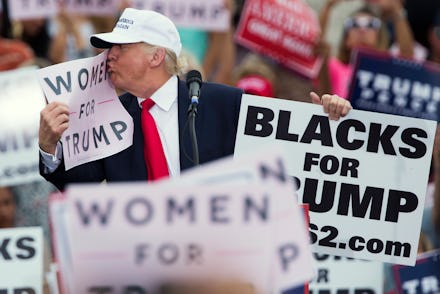White women had a crucial role in electing Trump to office and we need to talk about it

When Donald Trump was named the decisive victor of the 2016 presidential election early Wednesday morning, it was seen first and foremost as a tremendous loss for women.
But as it turns out, a large group of women got exactly what they wanted.
According to CNN exit polls, about 53% of white women cast their ballots for the Republican candidate. By comparison, just 4% of black women and 26% of Latino women voted for Trump.
The numbers might come as a surprise to those who assumed Trump's former opponent, Hillary Clinton, had a stronghold on the female voter bloc. They might also come as a surprise to those who thought Trump had thoroughly isolated himself from women when he'd called enough of them dogs, slobs and pigs; ranked them on attractiveness; or faced accusations of sexually assaulting a dozen of them.
Women of color, though, knew better.
"Most white women voted Trump, yet your fave white feminists are saying the election is proof America hates women," writer Bridget Minamore tweeted on Wednesday. "It's proof America hates POC."
While Clinton supporters thought they were fighting an uphill battle against Trump's — and America's — virulent misogyny, the enemy of the 2016 election had been racism all along.
"Amazed at the cognitive dissonance needed as a white woman to be insisting sexism is the real issue here when the literal KKK are chiming in," Minamore wrote in another tweet.
Of course, the 2016 presidential election was no single-issue race. Sexism, racism, Islamophobia and xenophobia all mingled together to form the overarching messages from Trump, his surrogates and his supporters.
But with whiteness being the most consistent indicator of a Trump voter in CNN's exit polls, Trump's upset seems to be acutely about race.
Trump's campaign to "Make America Great Again" was always about returning power to cis white male voters who'd been feeling threatened — perhaps by the immigrants stealing their jobs, the transgender people using their bathrooms or the women trying to earn an equal wage.
But if Trump makes good on his promise to empower white men in the U.S., white women have a lot to gain, too.
The president-elect's white female supporters may not be too concerned with feminism — or they may reject it completely — but feminism itself was founded on the hope that specifically white women could be equal to their white male counterparts. And on Election Day, 53% of white female voters cast their ballots with this same hope in mind.
Still, there lingers a stubborn question here: Why would female voters choose a candidate who would defund Planned Parenthood? Or overturn Roe v. Wade?
Those who consider women a monolith, and don't bother with considerations to race, class, sexual orientation or any other identity categories, see these women as voting against their own interests. But conservative women have been voting this way for centuries because they aren't so concerned with the issues at the forefront of, say, the women's liberation movement.
"My faith will not allow me to vote for a candidate who believes abortion is right," Trump voter Tina Vondran told the Cut last week. "I would love to see a woman president. Get Condoleezza Rice in there. I'm telling you what, if she ran, I would campaign for her. But Hillary and I don't share the same values."
Barbara Nelson, who'd originally planned on voting for former GOP candidate Ben Carson, similarly told the site, "I support him because he's the only Republican running for president ... I would not vote for a Democrat because of their platform, and especially I wouldn't vote for Hillary. It's especially the issue of abortion. I am a total pro-life person."
On Wednesday, the results of the 2016 presidential election held up a mirror to the face of America and exposed each of us for who we are, what kind of country we want to live in and who we care about.
White women knew exactly what Trump was selling on his presidential ballot, and they were buying it.